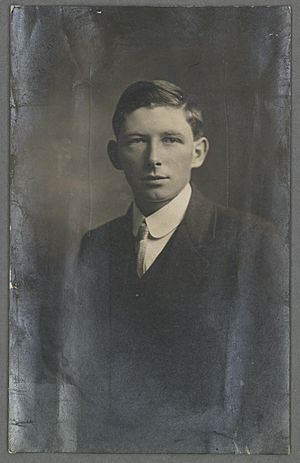Thomas Hughes Jones facts for kids
Thomas Hughes Jones (born January 23, 1895 – died May 11, 1966) was a famous Welsh poet and writer. He came from a part of West Wales called Ceredigion. Throughout his life, he wrote many collections of stories and articles for different magazines, including Welsh Outlook. In 1940, he won a special award called the Literature Medal for his story, "Sgweier Hafila," at the National Eisteddfod. People often called him by his shorter pen name, "T. Hughes Jones." His name is also carved on a memorial for poets in a place called Mynydd Bach.
Contents
Growing Up in Wales
Thomas Hughes Jones was born in a village called Blaenpennal. His parents were Rhys Jones and Ann Hughes. He had a younger sister named Jane. Sadly, his mother passed away when he was only six years old. After that, his father moved the family to Blaen Aeron Farm.
A poet named John Rowlands lived on the farm next door. He started teaching young Tom a special, old Welsh poetry style called `cynghanedd`. Together, they often took part in local `eisteddfodau`, which are Welsh festivals of music, literature, and performance. Tom's poems and recitations were usually very good and won many prizes.
Tom went to a local school called Ysgol Tanygarreg. He was known for being very smart and always having quick answers. His headmaster suggested that his father send him to the county school in Tregaron. There, he became known as 'Tom Bardd,' which means 'Poet Tom.' When he was just 17 years old, in 1913, he won his first 'chair' at the Llanddewi Brefi eisteddfod. Winning a chair is a very high honor for a poet. Before he turned 25, he won three more chairs at eisteddfodau in Tregaron, Ysbyty Ystwyth, and Rhydcymerau.
University Life and War Service
In 1913, Thomas Hughes Jones started studying at the University College of Wales, Aberystwyth. He finished his first degree in Welsh in 1916 with good grades. He kept writing a lot while at university. He wrote for and even edited Y Wawr, a university magazine, from 1915 to 1916. Later, he also wrote for The Dragon, another university publication.
His studies were paused in 1916 because of World War I. He joined the Welsh Guards and served in France. After the war, he returned to university and finished his Master's degree (M.A.) in 1922. His Master's paper was about 'Social life in Wales in the eighteenth century as illustrated in its popular literature of the period.'
His Writing Career
Thomas Hughes Jones continued to write throughout his life. His thoughts and feelings about the First World War are considered very important. They show how Welsh speakers felt during that time.
Winning the National Eisteddfod in 1940
In 1940, Thomas Hughes Jones won the Literature Medal at the National Eisteddfod. This Eisteddfod was special because it was called the "Radio Eisteddfod." Due to safety worries during World War II, it was held remotely, meaning people took part from different places.
He won the medal for his "long short-story" called "Sgweier Hafila." The prize was given for the best piece of literature that year, not just for a specific type of writing like in previous years. Kate Roberts, a famous writer who judged the competition, gave the award to Jones. She praised his story, saying it was a great way to show how people wish for something better and might even go a little crazy when they can't have it.
Gildas Tibbot, in his introduction to Jones's book Atgof a Storïau Eraill, also praised him. He said that Jones helped bring the "long short-story" style into Welsh-language literature. This type of story was later used by other famous Welsh writers, including Kate Roberts herself.


